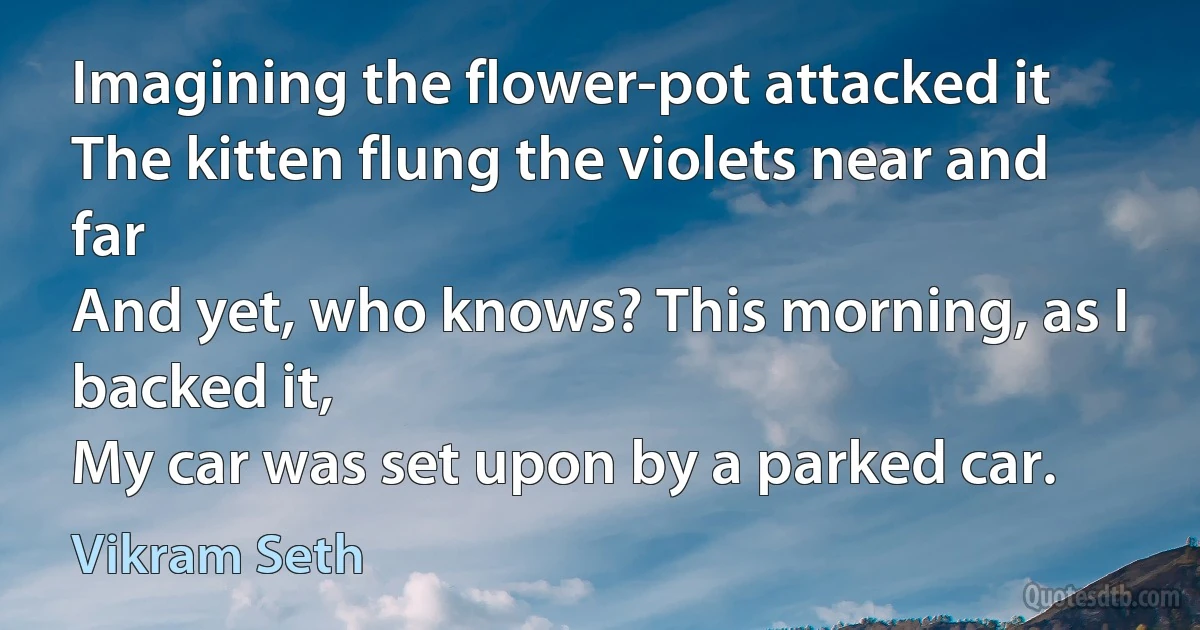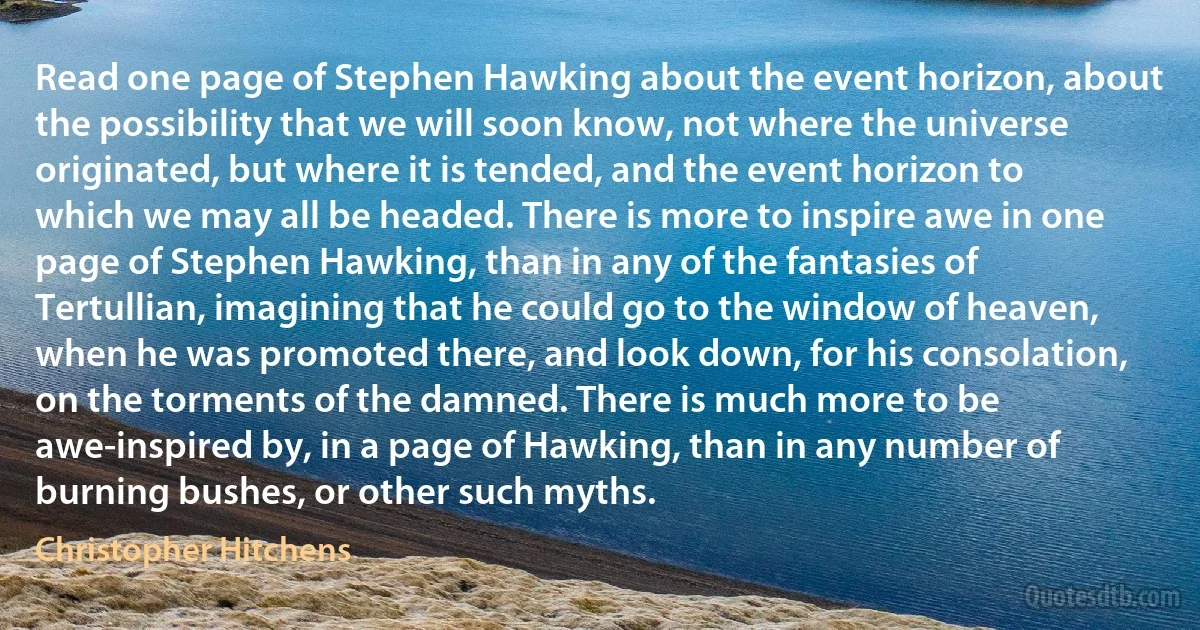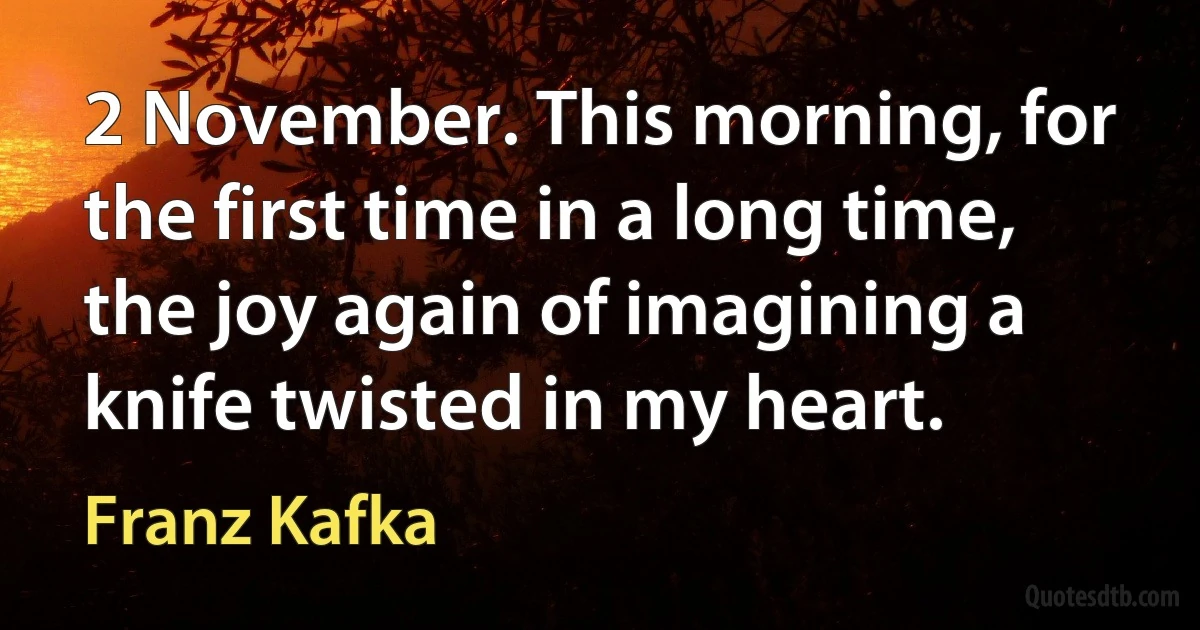Imagining Quotes - page 4
The U. S. is really beyond reason now. It is beyond our imagining to know what they are going to do next and what they are prepared to do. There is only one comparison: Nazi Germany... Nazi Germany wanted total domination of Europe and they nearly did it. The U. S. wants total domination of the world and is about to consolidate that...
Blair sees himself as a representative of moral rectitude. He is actually a mass murderer. But we forget that - we are as much victims of delusions as Americans are.

Harold Pinter
You could spend your whole life imagining ghosts, worrying about the pathway to the future but all there will ever be is what's happening here and the decisions we make in this moments which are based in either love or fear. So many of us choose our path out of fear disguised as practicality. What we really want seems impossibly out of reach and ridiculous to expect so we never dared the universe for it. I'm saying I'm the proof that you can ask the universe for it. My father could have been a great comedian, but he didn't believe that that was possible for him and so he made a conservative choice instead, he got a safe job as an accountant and when I was 12 years old he was let go from that safe job and our family had to do whatever we could do to survive. I learned many great lessons from my father, not the least of which was that you could fail at what you don't want, so you might as well take a chance on doing what you love.

Jim Carrey
Do not let the title of scholar, or poet, or lord, intimidate you overmuch. More importantly, do not delude yourself into imagining that such men and women are loftier, or somehow cleverer or purer of intgrity or ideal than you or the other commoner. We live in a world of facades, but the grins behind them are all wretched.

Steven Erikson
I miss having to wonder about any aspect of an artist's life. [This] was a luxury we don't have anymore. Whether it's the people surrounding them revealing things about their process or their personal lives, or the artists themselves going on Twitter and telling you what they're doing in the middle of the night with their girlfriend - it's like, ‘Wow, um... I really liked you better before you told me that. I really would like to go back to imagining the person that I was imagining.'

Davey Havok
[M]aybe the strings break, or maybe our ships sink, or maybe we're grass-our roots so interdependent that no one is dead as long as someone is still alive. We don't suffer from a shortage of metaphors, is what I mean. But you have to be careful which metaphor you choose, because it matters. If you choose the strings, then you're imagining a world in which you can become irreparably broken. If you choose the grass, you're saying that we are all infinitely interconnected, that we can use these root systems not only to understand one another but to become one another. The metaphors have implications.

John Green (author)
When someone goes to the doctor and says, "I hear a voice in my head," he or she will most likely be sent to a psychiatrist. The fact is that, in a very similar way, virtually everyone hears a voice, or several voices, in their head all the time: the involuntary thought processes that you don't realize you have the power to stop. Continuous monologues or dialogues. You have probably come across "mad" people in the street incessantly talking or muttering to themselves. Well, that's not much different from what you and all other "normal" people do, except that you don't do it out loud. The voice comments, speculates, judges, compares, complains, likes, dislikes, and so on. The voice isn't necessarily relevant to the situation you find yourself in at the time; it may be reviving the recent or distant past or rehearsing or imagining possible future situations. Here it often imagines things going wrong and negative outcomes; this is called worry.

Eckhart Tolle
Sure, sure I wanted out of this game. But I don't care what these writers say. My neck was wrenched about two weeks ago and I aggravated it when I continued to play. But I didn't want to miss any games when we are trying to win the pennant. We caught the Mets and we came here tonight leading them, and I think I had something to do with it. Like I say, I don't care what these writers think. They never believe me when I say I hurt. One time before, they wrote so much about me just imagining my back was hurting me that the manager decided to have me checked over by a specialist. I never did see the report, but Danny said he had been assured my complaint was legitimate, and that he was sorry there had been a misunderstanding. I couldn't know what he meant, but after that he never failed to ask about my back before he put my name in the lineup for the second game of doubleheaders.

Roberto Clemente
The chief pleasure of his life in these days was to go down the road and look through the window in the wall in the hope of seeing the beautiful Island. ... the sight of the Island and the sounds became very rare ... and the yearning for the sight ... became so terrible that John thought he would die if he did not have them again soon. ... it came into his head that he might perhaps get the old feeling-for what, he thought, had the Island ever given him but a feeling?–by imagining. He shut his eyes and set his teeth again and made a picture of the Island in his mind.

C. S. Lewis
Stevens's poetry makes one understand how valuable it can be for a poet to write a great deal. Not too much of that great deal, ever, is good poetry; but out of quantity can come practice, naturalness, accustomed mastery, adaptations and elaborations and reversals of old ways, new ways, even-so that the poet can put into the poems, at the end of a lifetime, what the end of a lifetime brings him. Stevens has learned to write at will, for pleasure; his methods of writing, his ways of imagining, have made this possible for him as it is impossible for many living poets-Eliot, for instance. Anything can be looked at, felt about, meditated upon, so Stevens can write about anything; he does not demand of his poems the greatest concentration, intensity, dramatic immediacy, the shattering and inexplicable rightness the poet calls inspiration.

Randall Jarrell
Reading fiction is important. It is a vital means of imagining a life other than our own, which in turn makes us more empathetic beings. Following complex story lines stretches our brains beyond the 140 characters of sound-bite thinking, and staying within the world of a novel gives us the ability to be quiet and alone, two skills that are disappearing faster than the polar icecaps.

Ann Patchett



